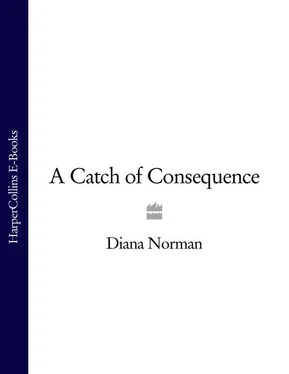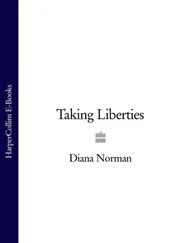Holding the blade with one hand – buggered if she’d lose a good oar – she grabbed at the man and hooked his jacket over the rowlock so that he hung from it, head lolling. ‘An’ you stay there.’
Somehow, keeping her weight to port, she feathered back to where Tantaquidgeon was kneeling, boathook in hand. She caught the hook’s business end and, none too gently, shoved it under the man’s coat which wrinkled up to the shoulders. She directed it as the Red Indian pulled. A long, wet body slithered onto her lobster-pots and flopped among waving, reaching claws.
Then she sat down.
After a while she stirred herself and, wincing, dragged at the man’s coat so that he was turned onto his back. Using her foot – it was less painful to her back than bending down to it – she nudged his face to one side then pressed her boot on his bread-basket, released it, pressed again. She pedalled away, as if at an organ, until water began dribbling onto the lobsters from the man’s mouth and he coughed.
Makepeace Burke and her catch looked at each other.
Through a wavering veil of nausea, the man saw bone and freckles, a pair of concerned and ferocious blue eyes, all framed by hair the colour of flames that had escaped from its cap and which, with the sun shining through it, made an aureole. It was the head of a saint remembered from a Flemish altarpiece.
Makepeace saw a bloody nuisance.
Here was not, as she’d thought, a lickered Son of Liberty who’d whooped himself into the harbour; the Sons didn’t sport clothes that, even when soaked and seaweeded, shouted wealth. Here was gentry.
‘Who are you? What happened to you?’
He really couldn’t be bothered to remember, let alone answer. He managed: ‘Does it matter?’
‘Matters to me .’ She’d expended a lot of effort.
Long time, thought Sir Philip Dapifer. Long time since I mattered to a woman. He drifted off, oddly consoled, into unconsciousness.
Makepeace sat and considered, unaware she was still whistling ‘The British Grenadiers’ or that her foot tapped in time to it on the drownder’s chest.
If the bugger hadn’t fallen, he’d been pushed and she’d seen it done . Watched by Bart and others, Mackintosh had thrown the poor bastard in like he was rotten fish. And left him – admitted, they couldn’t dally – not caring if he drowned or floated. And worked on him first from the look of him – his face might be the moon fallen into her boat, so livid and bruised it was.
So he was enemy. Customs, excise, taxman, Tory, British-bootlicker: whatever he was she’d rescued him. ‘Should’ve let you drown,’ she grumbled at him, knowing she could not.
What to do? If she handed him over to the authorities right now he could identify his attackers – and say what you like about Mouse Mackintosh and Sugar Bart, they were at least patriots and she’d be damned if she helped some Tory taxman get ’em hanged. ‘Ought to throw you back by rights.’
Well, staying here would surely solve the problem because, from the look of the drownder, he was on his last gasp. And that, thought Makepeace Burke, was pure foolishness – a waste of the trouble she’d taken in the first place.
She looked up at the quay and jerked her head at Tantaquidgeon to get into the boat. ‘The Meg. You row.’
She covered the body at her feet with the tarpaulin to keep it warm. There was still nobody about. What had been an event of hours for her had been minutes of everybody else’s time. Boston kept the sleep of the hungover. Tantaquidgeon’s white eagle feather bobbed hypnotically back and forth as he rowed past the slipways on which stood anchors as big as whale-flukes, past the rope-walks, the cranes, the ships’ chandlers, the warehouses and boatyards, all parts of the machine that on normal days serviced the busiest port in America.
Behind him, appearing to stand on an island, though actually on a promontory, was their destination, the Roaring Meg, two storeys of weatherbeaten boarding. Ramshackle maybe, like the rest of the waterfront, but an integral piece of the great ribbon of function which faced the Atlantic and provided incoming ships with their first view of the town. Here was Boston proper, not in its generous parks nor its wide, tree-lined streets and white-spired churches, not in its market places, bourses and pillared houses, but in an untidy, salt-stained, invigorating seaboard generating the wealth that sustained all the rest.
Makepeace was proud that her tavern was part of it. But it was a matter of shame to her, as it was to all right-thinking citizens, that there was yet another Boston. In the maze of lanes behind the waterfront, out of sight like a segment of rot in an otherwise healthy-looking apple, lay gin houses and whoreshops providing different services, where the crab-like click of dice and a tideline of painted women waited for sinners in darkness of soul.
The city fathers attempted to cleanse the area from time to time, but prevent it washing back they could not, nor did they entirely wish to; they were not only the town’s moral guardians but entrepreneurs in a port dependent on trade – and sailors from visiting merchant ships didn’t necessarily seek after righteousness.
A voyager disembarking at Boston’s North End had a choice. If he were heedless of his purse, his health and his hope of salvation, he would disappear into those sinning, acrid alleys. If he were wise, he would make for the coastal beacon that was the Roaring Meg, with its smell of good cooking and hum of decent conversation.
In winter, when light from whale-oil lamps shone through its bottle-bottomed windows to be diffused in snow, the Roaring Meg resembled a Renaissance nativity scene, a sacred stable. Named after the noisy stream that ran alongside it before entering the sea, the tavern deserved its halo. Makepeace kept it free of the Devil’s flotsam by perpetual moral sweeping, brushing harlots and their touts from her doorstep, plumping up idlers like pillows, ejecting bullies, vomiters, debtors and those who took the Lord’s name in vain.
A little stone bridge led over the stream to its street door above which was displayed the information that John L. Burke was licensed to dispense ales and spirituous liquors. John L. Burke was in the grave these three years, having energetically drunk himself into it, but a man’s name above the door inspired more confidence in strangers than would a woman’s, so Makepeace kept it there.
North End magistrates conspired in the fiction and, if asked, would say that the licensee was actually Makepeace’s young brother Aaron, but they knew, as did everybody else, who was the Roaring Meg’s true landlord and privately acknowledged the fact. ‘Makepeace Burke,’ one justice had been heard to say, ‘is a crisp woman.’
An accolade, ‘crisp’: American recognition of efficiency and good Puritan hard-headedness. Makepeace took pride in it but knew how hard it had been to win and how easily it could be taken away. One word of scandal or complaint to the magistrates, one impatient creditor, one more storm to hole the Meg’s creaking roof – there was no money with which to replace it – and she would lose her vaunted crispness and her tavern.
And now that she had a calm moment in which to consider the consequences of what she was doing – in Puritan society wise women always considered consequences – suspicion grew that she might be jeopardizing both merely by harbouring the drownder under her roof.
The Cut, the lane at the sea end of which the Meg stood, was as respectable as the tavern itself, a narrow row of houses that passed through the surrounding wickedness like a file of soldiers in hostile Indian forest. Eyes at its windows watched for any falter in its rigid morality and one pair in particular was trained on herself.
Читать дальше












